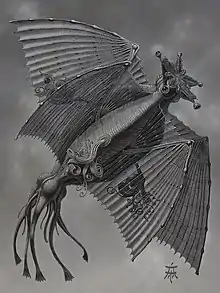Lovecraftian
English
WOTD – 26 May 2006
Etymology
Lovecraft + -ian, from H. P. Lovecraft (1890–1937), an American author of fantasy, horror, and science fiction, noted for combining these three genres within single narratives.
Pronunciation
- IPA(key): /lʌvˈkɹæfti.ən/
Audio (US) (file)
Adjective
Lovecraftian (comparative more Lovecraftian, superlative most Lovecraftian)

Elder Thing, a Lovecraftian monster.
- Frighteningly monstrous and otherworldly, sometimes with terrifyingly unnatural anatomy.
- 1984, Dean R. Koontz, Darkfall, page 362:
- The tip of the thing was equipped with long whiplike appendages that writhed around a loose, drooling, toothless mouth large enough to swallow a man whole...Perhaps this was the only thing that the escaping Lovecraftian entity had thus far been able to extrude between the opening Gates — this one finger.
- Of, pertaining to, or emulating the style or works of author H. P. Lovecraft (1890–1937).
- Lovecraftian horror
- Lovecraftian fiction
- 2006, A. Blackwood, August Derleth, The Ithaqua Cycle, page 102:
- The present story, "Born of the Winds", is one of the best. For one thing, the vision of the story is pure Lovecraftian cosmic pessimism.
- 2007 September 23, David Bowman, “Torchlit Crit”, in The New York Times, →ISSN:
- That abandonment, incidentally, compelled Sam’s mother to fill her young son’s head with H. P. Lovecraftian horror-style lies about the interior of Emily Dickinson’s house, lies that motivated her son’s break-in to begin with.
Translations
of, pertaining to, or emulating the style or works of author H. P. Lovecraft (1890-1937)
|
Noun
Lovecraftian (plural Lovecraftians)
- A fan of American author H. P. Lovecraft (1890–1937).
- 1944, The New York Times Book Review, page 19:
- For zealous Lovecraftians there are a few choice tidbits—a short autobiography, his commonplace book, and his “History and Chronology of the Necronomicon.”
- 2005, Michel Houellebecq, translated by Dorna Khazeni, H. P. Lovecraft: Against the World, Against Life, Cernunnos, Abrams Books, published 2019, →ISBN:
- Finally, we can draw a definitive fourth circle, at the absolute heart of HPL’s myth, which contains what most rabid Lovecraftians continue to call, almost in spite of themselves, the “great texts.”
- 2014, Gaiman Neil, Acolytes of Cthulhu, Titan Books, →ISBN:
- Everyone is a “creative anachronist,” but we Lovecraftians, like our cousins in other Buddha-fields of fandom, have elected to live a minority, sectarian existence in what sociologists Berger and Luckmann (The Social Construction of Reality) call a “finite province of meaning.”
See also
This article is issued from Wiktionary. The text is licensed under Creative Commons - Attribution - Sharealike. Additional terms may apply for the media files.